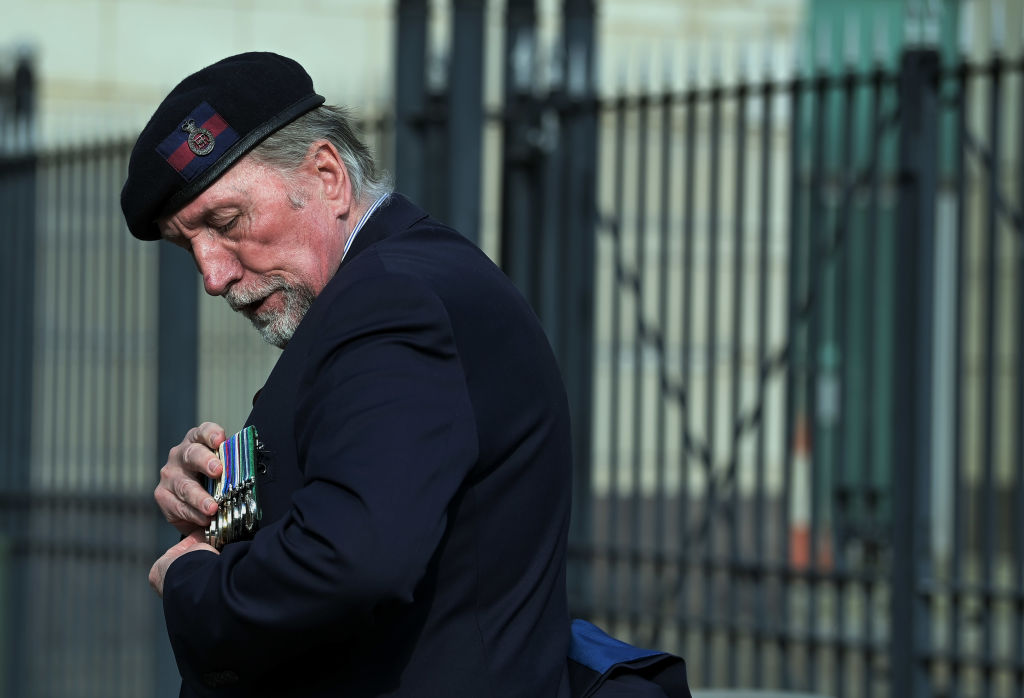Twenty-three years after 9/11 and one year after 7/10, yet still the West refuses to learn that flexibility before Islamism is perceived as cowardice, tolerance as weakness, and ideological multiculturalism simply the white flag of unconditional surrender. The same week as Israeli soccer fans narrowly escaped being massacred in Amsterdam, the Mayor of Vienna Michael Ludwig announced that the plan to erect a statue to commemorate the victory of the Polish King Jan III Sobieski over Ottoman forces outside Vienna was being rejected, lest it be seen as Islamophobic and anti-Turkish.
Quite so: instead of compelling outsiders to adhere to European values, Europe bends a knee to their values, and hence Amsterdam last week nearly had its first Jew-massacre since 1945.
The Battle of Vienna is traditionally perceived as being a vital chapter in the preservation of political Christianity in Europe, and indeed it was. Wherever the Ottoman Empire triumphed, institutional Islamisation followed, and Christianity was marginalised and penalised, though usually following a hearty massacre of Christians. After Constantinople fell in1453, thousands of women, girls and boys were raped, most men killed, and the many thousands of survivors sold into Ottoman slavery, disappearing from history as completely as the millions of Africans who suffered the same fate.
There is. in short, a good reason why Europe still respects King Jan III as a champion of its values. But this is how one liberal website, Kafkadesk, describes the issue: “The Polish king is regularly depicted by Christian and right-wing nationalists as having saved Christendom from Islam. As a result, the siege of Vienna has increasingly become a central part of the European far-right ideology who see the Battle as a turning point at a time when Islam seemed poised to overrun Christian Europe….The Norwegian terrorist Anders Breivik, who killed 69 people at a Labour Party annual summer camp in 2011, even paid homage to the Battle of Vienna in his manifesto, 2083 – A European Declaration of Independence.”
So, in a single paragraph, the issue has leapt from a seminal 17th century event to its alleged misinterpretation by “right wing” nationalists, concluding with a murderous frenzy by a deranged paranoid schizophrenic. That final description was how Breivik, who in fact slaughtered 77 (not 69) people in two killing sprees in Norway in 2011, was clinically analysed by police psychiatrists. This placed him outside the realm of ordinary criminal law and firmly in the realm of mental illness, deserving of lifelong incarceration in an institution for the criminally insane. But of course, this did not suit Norway’s achingly multicultural agenda, so he was re-analysed and found to be sane, and therefore amenable to Norwegian criminal law. This made the Norwegian legal establishment extremely happy: now they had their very own poster-boy Nazi to counter-balance the presence of Islamist extremists amid the fjords.
Though Breivik was clearly a barking nutcase who had very intentionally slaughtered scores of children of his own race and religion, and tragically was not blown to pieces by the Norwegian police, he has been recruited into a discussion about the future of a statue to commemorate a Christian hero of three and a half centuries ago. This is a classic example of how liberals invariably assess contemporary matters, leaving no argument uncorrupted by their meditations. Nor is this just a Norwegian or Scandinavian derangement, but a standard template: a feverish hunt for equivalence between imported Islamism and native extremism is one of the defining characteristics of modern liberal European culture.
Take the slaughter of young girls in a Taylor Swift dance-class in Southport, England earlier this year. Initially, the police reported the killer was from Wales, before admitting that, well, actually, he was not quite your bog-standard Welshman, being of “Rwandan heritage.” They then issued a picture of the charming schoolboy he had once been, making the whole matter seem like some sort childish horror story. This did not prevent an outburst of wholly irrational and idiotic rioting across England, with much on-line speculation that the killer a Muslim. Those identifiably making such allegations were later arrested and charged with hate-crimes. The Home Secretary Yvette Cooper even violated the sub judice principles protecting people in custody by declaring: “We’ve made sure there are additional prosecutors in place, that there are prisons, that prison places are ready, and also that the courts stand ready as well…the full range of offenders …will face arrest and a prison cell.”
This was contempt of court and a violation of the presumption of innocence that is a core of English law, which would have caused uproar had the accused been of immigrant stock. And then, coincidentally, just days before the Amsterdam riots, the English police admitted that the alleged culprit had been in possession of al Qaeda training manuals and had been trying to make the deadly toxin ricin. The allegations of Islamist motives had been accurate, which the Home Secretary must have known when she made her statements. Having in essence corrupted the judicial process with her instructions to convict and imprison white rioters, this time (and sensibly) Cooper stayed silent.
Comparable riots erupted in Dublin a year ago after some little girls were knifed outside their school. The culprit was an Algerian and a repeat-offender who had lived in Ireland for 20 years. The Irish police, the Garda, announced that the attack was not terrorism-related, though without explaining how they came to that useful conclusion. Would a white man knifing black children not automatically be presumed to have been motivated by race-hatred, making his crime implicitly terrorist?
There are many comparable cases of two different rulebooks applying according to who the suspects were and what might have been their motives. Underlying this is the presumption that there is no such thing as Western civilisation, and whatever values existed in Europe were not special in any way, and so should not be celebrated.
But there were and remain clear differences between rule in Ottoman Empire and the adjacent Christian empires and kingdoms, perhaps most startlingly illustrated in the rule of Mehmen III, who in 1595 executed nineteen half-brothers and drowned seven pregnant concubines. This offers a pen-picture of a quite different civilisational order, on one side of which Henry VIII was a terrifying departure from a norm, and on the other, a relatively dreary norm itself.
Yet Western liberals nonetheless maintain the fiction that one empire was pretty much the same as another, so that the Battle of Vienna is presented being far from a mere fight between Islam and Christianity. Dag Herbjørnsrud, a believer in “decolonising” history, says of the battle, “if we examine (it) closely, we can understand it rather differently, as a battle based on inter-ethnic cooperation”.
This is typical of modernist pieties, suggesting that there is nothing new about multiculturalism, whereas in all “supposedly” multicultural societies, there has always been a ruling ethnicity-based ethic to which other ethnicities were subordinate, as in the British Empire. Herbjørnsrud also argues that Jan III Sobieski, the king of the multilingual and multi-religious Polish-Lithuanian Commonwealth, might not have won the battle were it not for the help of his country’s Sunni Muslim Tatars, whose “light cavalry became a vital factor in almost every battle in Polish-Lithuanian history”.
That means nothing. Serbian cavalry served with Ottoman forces in the conquest of Constantinople. Pawnee scouts served with the US Cavalry. The advances of the British empire in India were usually with locally recruited soldiers, often Sikhs. Regardless of the make-up of his forces, King Jan III Sobieski prevented the fall of Vienna. Is that worth celebrating? From the point of view of the glorious Austrian centuries that followed – with the exception of the appalling Strauss family, very emphatically. Lifelong slavery resulted for those captured by the Ottomans, but not vice versa.
Herbjørnsrud points out that the Ottomans occasionally had political allies in the west, such as Louis XIV of France and William of Orange. But this was a matter of self-interested diplomacy, not of comparable value systems. Because Churchill, Roosevelt and Stalin were in a purely opportunistic alliance did not mean that they operated comparable systems of governance.
One could certainly argue that it is up to the Austrians to decide whether they want to celebrate one of the most important victories in history. But equally, it is surely time for Europe to declare its specialness, as in: Enter the birthland of freedom and you are welcome provided you follow our rules. These rules were hard-won, by rivers of blood and a vast treasury of gold and are based on the tolerant principles of Christian Democracy, shaped over many centuries. Why should Europe not insist on a compliance with those principles? After all, the Ottomans of yesteryear had, and the Turks of today have, no trouble about being proud of their history, including the celebratory Islamification of what once were great Byzantium basilicas. Only within the spineless presidium of the EU would the defining principles of European civilisation still be defied, decried and denied.
Kevin Myers is an Irish journalist, author and broadcaster. He has reported on the wars in Northern Ireland, where he worked throughout the 1970s, Beirut and Bosnia.





Trump will let America love its culture, its homeland and its own society